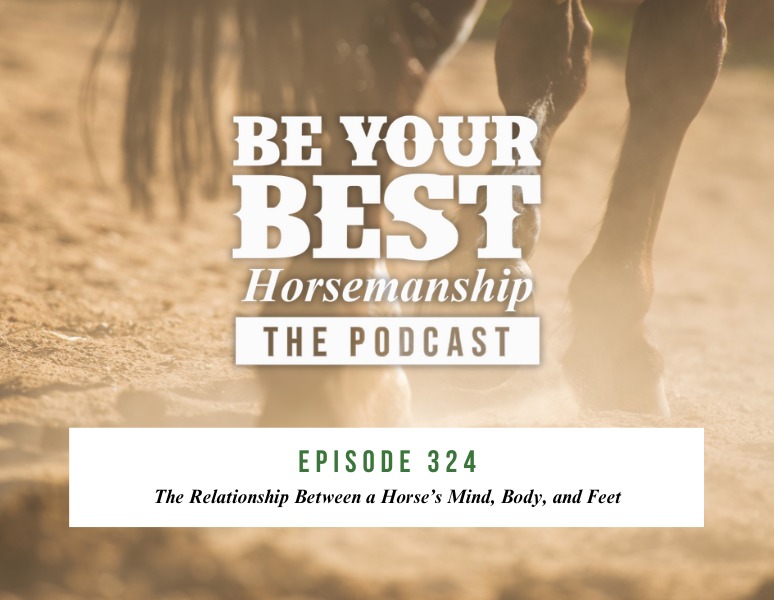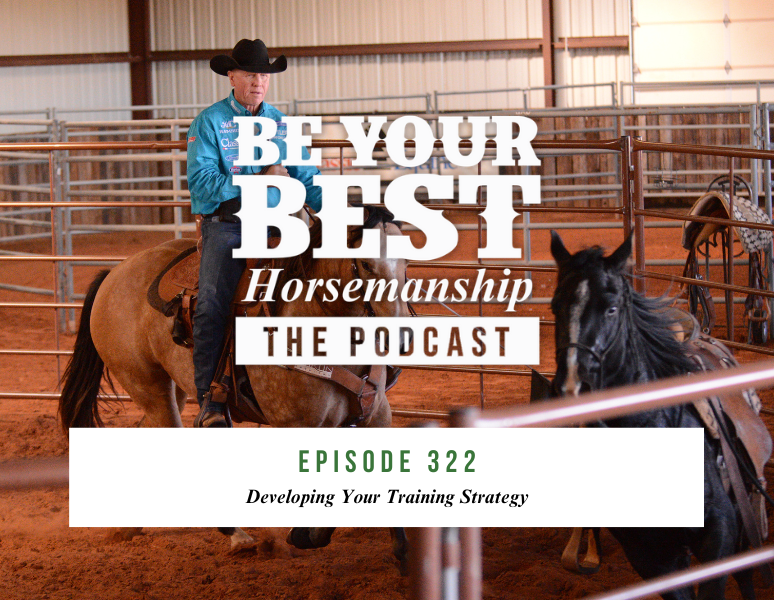Ep 267: Adopting a Proactive Approach to Your Training Program
I’m excited to bring you today’s conversation with someone I’ve known for years—Mark Upton from Central Life Sciences. We've spent a lot of time working together, both in the field and discussing ways to improve our industry. Mark’s not just an expert in pest control and livestock management; he’s someone who lives and breathes agriculture and horse training. In this conversation, we dove into a variety of topics, from taking a proactive approach to fly control at your facility to the evolving horse industry and why it’s so important to get the foundational work right early on with your horses.
For those of you who don’t know Mark, he’s been a key player in the ag world for a long time and has a deep understanding of how insect control plays a vital role in equine facility management. But beyond his professional expertise, Mark has a true passion for the western lifestyle. He’s not just a guy talking from a desk—he lives it, working with cattle and raising horses himself.
Mark's position at Central Life Sciences involves managing two businesses—one focused on feed additives that prevent flies in livestock, and another handling products like scatter baits, sticky traps, and sprays. These products are crucial for managing not just the flies, but other pests that threaten our animals. If you’ve ever had a horse constantly stomping at the flies, or a cow covered in horn flies, you know exactly what we’re talking about. Flies aren’t just an inconvenience—they cause stress, damage, and even health problems.
As we approach the warmer months and the fly season ramps up, Mark shared some insights on the importance of taking a proactive approach to fly control. I can’t stress enough how much easier life is when you stay ahead of the problem, instead of reacting to it after the flies have already taken hold.
The Silent Assassin: Flies and Their Impact
One of the first things Mark pointed out is how flies can be the “silent assassin” in our daily operations. Flies may seem small, but they can cause huge issues for our horses and cattle. For horses, flies are more than just an annoyance—they can lead to performance issues, health problems, and even injuries.
I’m sure many of you have been there—your horse standing in the corner of the pen, stomping their feet incessantly, trying to rid themselves of the torment. Not only is this frustrating, but it’s also damaging to the horse's body. The front end of a horse absorbs the most shock, and repeated stomping only compounds the strain. It’s important to recognize that flies are more than just a surface-level issue. If your horse is distracted by flies, they’re not focused on you or what you’re trying to accomplish in that moment.
Getting Ahead of the Problem
Mark shares that while you can’t eradicate flies completely, with the right strategy, you can significantly reduce their numbers and keep them under control. The key takeaway here is being proactive, not reactive. Now is the time to sit down and reflect on what worked for you last season. What fly control methods did you use that had a real impact? What didn’t work? Make note of those observations now, so you can approach the spring with a solid plan.
One of the first steps in a proactive fly control strategy is to get your feed additives in place before the fly season kicks off. In the area where Mark and I live, we recommend starting those feed additives about two to four weeks before the expected fly season. For most of us, that’s sometime in early to mid-March. The earlier you start, the more effective those additives will be.
Comprehensive Facility Management
Taking a comprehensive approach to managing fly control at your facility is crucial. Mark made a great point about how flies also affect cattle, and how cattle and horses are linked in fly control. If you’re keeping cattle around, especially in the roping business, you’ve got to make sure you're addressing flies on the bovine too. Flies don’t discriminate—they’ll go wherever they can find a host. So, if your cattle are being neglected, it’s going to affect your horses as well.
For example, horn flies are blood-suckers that target cattle, and those flies will make their way to your horses too. If you’ve got a good fly control system for your horses but aren’t doing anything for your cattle, you could still be dealing with a serious horn fly problem.
The Link Between Fly Control and Reproductive Success
Mark also touched on something that often gets overlooked—how flies affect reproductive performance in both cattle and horses. In the cattle industry, if flies are causing stress, it can affect breeding and even herd health. The same goes for horses, especially mares. If you’re trying to get mares bred back after they’ve foaled, and they’re standing outside fighting flies, that stress can absolutely affect their ability to rebreed.
Flies don’t just cause minor discomfort—they can affect a horse’s ability to perform and even impact their health in the long run. If a horse is distracted by constant fly irritation, they won’t be performing at their peak.
The Tools You Need for Success
One of the best things about fly control today is that there are so many options available. It’s no longer a matter of using one single product and hoping for the best. You can feed supplements, use sprays, set up traps, and scatter baits. It’s about finding the right combination for your operation. I personally use a combination of approaches, from feed-through products for the horses to spray solutions for the ones I can catch and work with. Whatever works best for your situation, the goal is to have a plan in place that helps keep the flies under control.
One of the simplest things you can do is to keep your operation clean and clear of standing water. It’s amazing how something as simple as keeping buckets and troughs clear of stagnant water can make a huge difference in controlling mosquitoes and other pests. If you’ve got standing water around your property, those mosquitoes will find it and breed.
Control What You Can Control
We all know that life throws enough curveballs. The key is to control what you can control. By taking a proactive approach to fly control, you can eliminate one major stressor in your horses’ and cattle’s lives. And when you reduce stress, you’re setting them—and yourself—up for greater success. Whether you’re dealing with flies, mosquitoes, or other pests, there are plenty of tools out there to help you manage the problem effectively.
The Futurity Boom: A New Era for Young Horses
One of the major topics we discussed was the explosion of futurities in the horse world, and it’s clear that these events have dramatically raised the bar for both trainers and horses. The competition is fierce, but it’s also provided a valuable opportunity to slow down the process and focus on doing things the right way. Mark mentioned how the increased prize money in these events has made it feasible for trainers to invest the time necessary to create a solid foundation in young horses. This isn’t just about speed; it’s about building horses that are mentally and physically prepared for the future.
What’s exciting to see is the number of elite horses coming out of these programs. Some of the top names in rodeo today are now breeding horses and competing with them in these futurities. The caliber of the horses and the people involved in these events is unmatched, and it’s pushing the entire industry forward.
As Mark said, it’s not just about the monetary rewards. Even if you don’t win big, at the end of the day, you’ve got a quality horse that you can continue to enjoy for years. And the opportunities for success at different levels are greater than ever. Whether you’re aiming for the top or just looking to have a solid, competitive horse, the futurities offer something for everyone.
The Process and Patience Behind Success
Another key part of our conversation focused on the importance of a methodical, process-driven approach to training horses. Mark is a huge proponent of taking your time and doing the job thoroughly, rather than rushing the process. When he talked about training, you could hear his passion for giving horses the proper foundation, emphasizing the need to start working with them early.
This process-driven approach is what sets great horses apart from the rest. As Mark put it, when you take the time to lay the groundwork with a horse—whether it's starting them as a weanling or giving them the basics as a yearling—you’re setting them up for life. The goal is to have a horse ready for a rider to safely get on in just a few short days, not months down the line. This is exactly what we’ve talked about in past blog posts—the value of a solid foundation and how it makes all the difference when you’re working with a horse, whether it’s in a roping competition or just everyday riding.
Mark’s philosophy on training is clear: It’s all about making the horse feel comfortable and confident in their environment. This is the key to success when you're starting colts and teaching them new skills. When horses trust their handlers, they’re more willing to try new things, and that trust translates to greater performance in the arena.
The Power of Consistency: Setting Up for Success
One of the biggest takeaways from our conversation was the importance of consistency and discipline, not just in horse training, but in every aspect of life. Whether it’s how you train a horse or how you approach a competition, being consistent and following a plan is what leads to long-term success. Mark stressed how every trainer needs to prove themselves every single day, and this is a mindset that translates across all industries—not just the western world.
This kind of discipline doesn’t just help you in the arena; it extends to every area of your life. It’s about staying focused, being diligent, and showing up every day to do the work. And in the world of horses, the work is never easy, but it’s always worth it.
Where We’re Headed: The Future of the Industry
As Mark and I talked about the future of the industry, one thing became clear: We’re in an exciting time for horse training and the western lifestyle. The futurities are providing greater opportunities for young horses and trainers, and with that, we’re seeing a shift in the quality of horses being bred and trained.
But what’s also exciting is the shift in how people are approaching the training process. More trainers are embracing foundational horsemanship and focusing on getting the basics right from the start. This focus on building confidence, trust, and a solid foundation is changing the game for future generations of horses. The way we approach training today is light years ahead of where it was even just a decade ago, and that’s only going to continue to improve.
Mark’s thoughts on the future of the western lifestyle and horse industry are exactly what we all need to hear: We’re lucky to be a part of it. As he said, we’ve got the best deal going, and even though we may not do everything perfectly every day, we’re in the right business. There’s a lot of pride in what we do, and that’s what makes the Western world so special.
A Bright Future Ahead
As we wrapped up our conversation, I couldn’t help but feel energized by the direction our industry is heading. We’ve got more tools, more opportunities, and more resources than ever before, and that means better horses, better training, and better opportunities for everyone involved. From futurities to foundation horsemanship, the future of the Western industry has never looked brighter.




